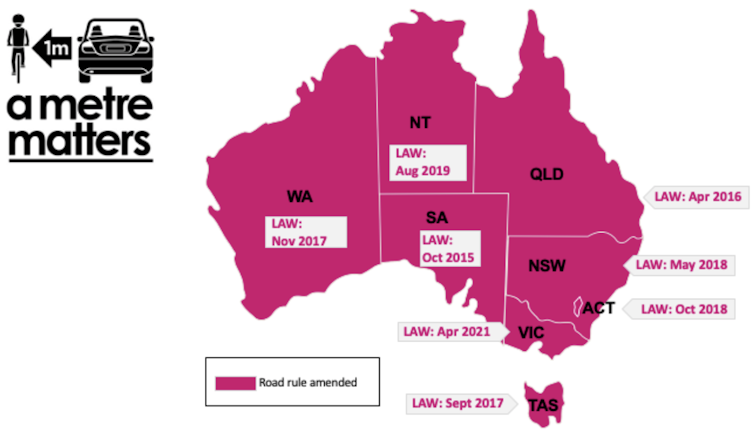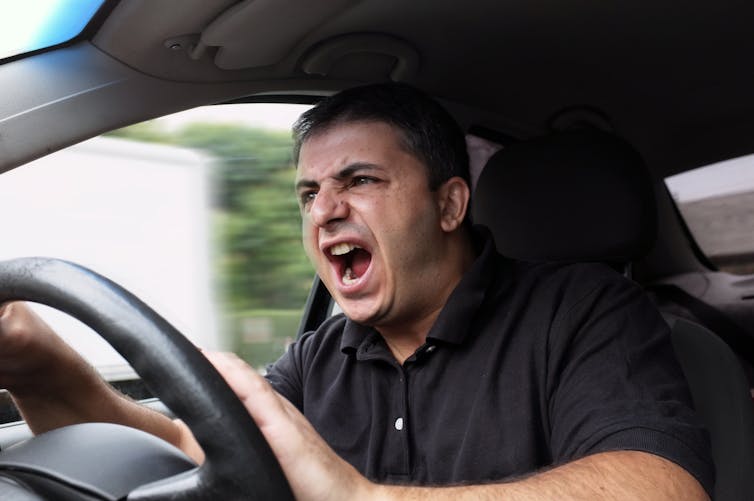Minimum space for passing cyclists is now law Australia-wide. It increases safety – but possibly road rage too
- Written by Laura Fruhen, Lecturer, School of Psychological Science, The University of Western Australia
To protect cyclists on the roads, state governments in Australia have introduced laws that set a minimum space drivers must give cyclists when overtaking them. These laws are now in place nationwide, with Victoria the final state to join the ranks last month. But do these passing distance laws actually change drivers’ behaviour towards cyclists?
Our research set out to answer this question by evaluating Western Australia’s passing distance law introduced in 2017. We found that since the law took effect drivers do indeed report giving cyclists more space when overtaking. However, there were possible unintended consequences. Drivers also self-reported more aggressive behaviour directed at cyclists, such as beeping horns or swearing.
Read more: Delivery rider deaths highlight need to make streets safer for everyone
What is in a passing distance law?
Passing distance laws are based on the understanding that close overtaking by cars greatly increases the risk of accidents involving cyclists and motor vehicles. Previously, drivers had to use their own judgement in providing “sufficient” space when overtaking cyclists. Now the laws instead specify a minimum distance.
In Australia, the distance is usually 1 metre on roads with speed limits less than 60km/h and 1.5 metres on roads with higher speed limits.
 Laws requiring that motorists observe a minimum passing distance when overtaking cyclists now apply across Australia.
Amy Gillett Foundation
Laws requiring that motorists observe a minimum passing distance when overtaking cyclists now apply across Australia.
Amy Gillett Foundation
Some European countries and several states in the US have adopted similar laws.
Lawmakers understand that legislation can also send important social signals: cyclists are legitimate road users, and the road is a safe place to cycle.
Why do we need these laws to protect cyclists?
Cycling is a healthy and environmentally friendly mode of transport. It can play a key role in reducing pollution and congestion in ever more densely populated cities. Yet cycling rates in Australia are low.
Clearly, it would be desirable for more people to take up cycling. Why is this not happening?
Partly, low cycling rates might be due to the risks involved in cycling. Cyclist fatalities and injuries have been on the rise in Australia in recent years. We know this is not related to the roads becoming more dangerous for everybody, because car driver deaths have been decreasing over the same time.
Read more: Rising cyclist death toll is mainly due to drivers, so change the road laws and culture
As well as objective safety, cycling participation is also related to whether people perceive cycling to be safe. Part of this perception comes from how other road users treat cyclists. Unfortunately, cyclists report motorists direct a fair amount of aggressive behaviour at them.
So what difference do these laws make?
Our study in WA confirms what others have found: passing distance laws make overtaking by cars safer for cyclists.
However, we found the law may have the unintended side effect of increased aggressive behaviour towards cyclists.
There are several possible explanations for these unintended changes. We think it is an issue of culture: Australia is a car-centric society. Many car drivers in Australia believe cyclists do not belong on the roads.
Read more: Drivers v cyclists: it's like an ethnic conflict, which offers clues to managing 'road wars'
Passing distance laws signal that cyclists are deserving of space and may “force” drivers to give cyclists more space, against their beliefs. Some drivers may give cyclists more space to comply with the law, but counter any discomfort they experience by being more aggressive towards cyclists.
Drivers often experience frustration with having to overtake cyclists and other slow road users. The law may have actually drawn attention to this frustration, which in turn may have contributed to more aggressive behaviour among drivers.
 An increase in driver aggression directed at cyclists appears to be an unintended consequence of the laws.
Shutterstock
An increase in driver aggression directed at cyclists appears to be an unintended consequence of the laws.
Shutterstock
We also found cycling rates have remained stable since the passing distance law was introduced. Unfortunately, this suggests the law did not translate into greater enthusiasm for cycling.
What can be done to improve the situation?
If these laws have these side effects, what else can we do?
It seems passing distance laws are effective in regulating the specific behaviour of overtaking cyclists. This is great news for cyclists’ safety. However, to make cycling safer overall, and to increase cycling rates, further measures to complement these laws are needed.
Changing drivers’ deeply ingrained beliefs and attitudes towards cyclists may be a longer process, but one worth embarking on. Infrastructure and road layouts also matter and can play a role in shifting priorities away from cars.
Read more: We can design better intersections that are safer for all users
Infrastructure that plans space for cyclists would reduce the number of interactions between cyclists and drivers. It also signals that cyclists have a right to this space.
As an added benefit, this type of infrastructure can play a key part in preparing the road network for emerging technology such as e-scooters and other transport modes.
Public policy is an inexact science. Most new laws will have some unintended consequences. Our study confirms the importance of careful evaluation of such laws. It shows the passing distance law is a great first step, but more can be done to protect cyclists on the roads.
Authors: Laura Fruhen, Lecturer, School of Psychological Science, The University of Western Australia





